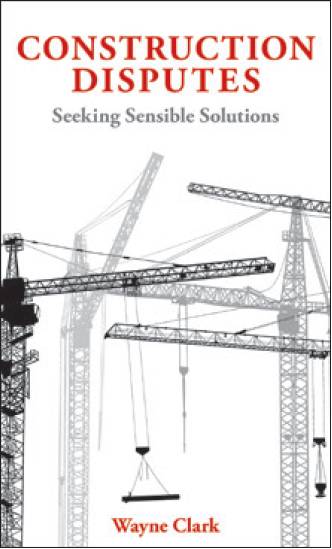Bookshelf

Construction Disputes: Seeking Sensible Solutions
Wayne Clark Hardback, London Publishing Partnership
£30.00 136 Pages ISBN-13: 9781913019488
I was looking forward to reviewing the book as I have known the author Wayne Clark professionally for some 15 years and favourable reviews had been provided by leading construction lawyers and engineers including Julian Bailey; Victor P Leginsky; Nicholas Gould and Dr Mohammed Abdulla Al-Kuwari. I first met Mr Clark in the UAE and then again in Qatar where we were trying to encourage the use of dispute boards through our association with the Dispute Resolution Board Foundation. Mr Clark worked on some of the largest and most contentious projects in the Gulf region and with over 50 years of experience across the globe has some real personal insights into what works and what doesn’t. He is a chartered quantity surveyor, arbitrator and mediator and has fulfilled various roles including contract manager, commercial manager and expert advisor.
This is a brilliantly lucid and enlightening look into the methods of avoiding construction claims and disputes. If this is not possible, the book also dives into the best ways to prepare for mediation, adjudication or arbitration. In this book, Wayne Clark uses his expertise and experience to demonstrate the importance of preparation, negotiation and wise management as a means of not only avoiding disputes, but as a way to make sure a project runs smoothly.
The style and structure of the book is aesthetically pleasing, ordered and clear which makes the book very easy to read. Comprehending all the points was simple; the theory that preparation and wise management avoid disputes was substantiated by clear, real-life examples which the author had experienced. The book was a much more enjoyable read as a result. There are also useful summaries at the end of each chapter, which aid to refresh your memory of the chapters.
This book is recommended for both those with a lack of experience and those with a lot of experience in the field of construction claims. It is a concise, articulate, and informative read, which many people will find useful. The focus on managing people in a construction project is seldom talked about and would lead to many projects having no disputes; ego and emotion get in the way of settling disputes far too often. Wayne Clark demonstrates that win-win solutions are preferred to egoistic confrontation. The book suggests the use of the ‘shadow arbitrator’ who, if instructed early in the dispute process, can guide parties and legal counsel to prepare claims and arbitral pleadings that will persuade a tribunal and, hopefully by quality submissions, assist the parties to find sensible solutions rather than fight the dispute in a contentious and expensive arbitration.
Helpfully the book provides a recommended further reading section for those who may be new to the topics. The only drawback is that it doesn’t really cover the UK situation where adjudication has replaced arbitration and litigation and tardy response to claims can easily lead to an adjudication.
I’d certainly recommend purchasing it, the book comes in a variety of formats including a Kindle version making it ideal for those working internationally and who may not want to ‘lug’ a copy around with them.
Sean Sullivan Gibbs BSc LLM FCInstCES FRICS FCIOB